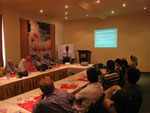
Macter's-Seminar
At a seminar held recently under Active Mother Active Nation (AMAN) campaign of Macter, Prof Ayesha Khan, referring to research published in American Journal of Clinical Nutrition pointed out that there is high prevalence of Hypovitaminosis D and Osteomalacia in South Asian pregnant women.
Referring to Archives of Disease in Childhood, she stated that there is high prevalence of Hypovitaminosis D in women of child bearing age. According to a research conducted on various immigrants group living in Oslo, Norway, prevalence of Hypovitaminosis D was found to be highest (64.9%) among the women born in Pakistan; Prof Ayesha revealed.
She explained that functions of Vitamin D include bone formation, inhibition of cellular growth, stimulation of insulin secretion, modulation of immune function and inhibition of renin production. She informed that Vitamin D is needed for mineralization of bones, metabolic processes, absorption of calcium and phosphate from intestine, synthesis of alkaline PO4, transportation of calcium and reduction in calcium excretion from kidneys.
Prof Ayesha stated that Vitamin D deficiency leads to poor calcium absorption and low calcium level stimulates parathyroid hormone (PTH) which in turn drains calcium from bones, increases the excretion of PO4 and reduces CaPO4 resulting in osteopenia and osteoporosis.
Highlighting the consequences of Hypovitaminosis D in pregnancy on children, she informed that it may lead to poor calcium homeostasis, poor skull ossification, poor development of immune system, risk of developing diabetes in later life, increased risk of cancers in adulthood, hypocalcemia, convulsions, craniotabes, large fontanelles and rickets. It may also result in poor maternal weight gain, and pre-eclampsia, she added.
Discussing about a research on Vitamin D supplementation during pregnancy, reported in British Medical Journal, she shared the findings that mothers in treatment group had faster maternal weight gain in 3rd simester and neonates had no hypocalcemia and had normal level of Vitamin D; while the placebo group exhibited low plasma concentration of Vitamin D, symptomatic hypocalcemia, small for date babies, large fontanelles and impaired ossification.
Stressing the need for Vitamin D supplementation during lactation, she informed that decreased concentration of Vitamin D in mother’s milk may lead to neonatal and infantile hypovitaminosis and decreased calcium levels, which may result in rickets.
Discussing about the effects of hypovitaminosis beyond pregnancy, she informed that it may result in osteoporosis, non-specific musculoskeletal pain, polycystic ovaries, obesity, cancer and poor immune system.
She provided various references of studies suggesting that chronic non-specific musculoskeletal pain is associated with hypovitaminosis D and advised to assess the level of Vitamin D in such cases.
Prof Ayesha informed that Vitamin D with calcium therapy shows promising results in cases of polycystic ovaries. Referring to a study published in Rheumatology International, she stated that alfacalcidol is superior to plain Vitamin D (cholecalciferol). According to the Journal alfacalcidol, but not plain vitamin D, has pleiotropic effects improving bone and muscle metabolism and clinical symptoms.
Dr Azhar Chaghtai, Consultant Neonatologist, speaking on the occasion stated that rickets is the most common form of bone disorder and extreme Vitamin D deficiency is its cause. Rickets can also present with seizure, respiratory infection and diarrhea. The neonatal Vitamin D status is strongly related to maternal Vitamin D level, he said,
Deficiency of Vitamin D during pregnancy can cause intrauterine growth retardation, inborn rickets, craniotabes, delay in growth velocity during first year, delayed eruption of teeth and enamel problems, delayed closure of anterior fontanel and flaring of wrist.
Dr Azhar Chaghtai advised for supplementation of Vitamin D3 to pregnant women in adequate amount, which is essential for the mother and her offspring.
